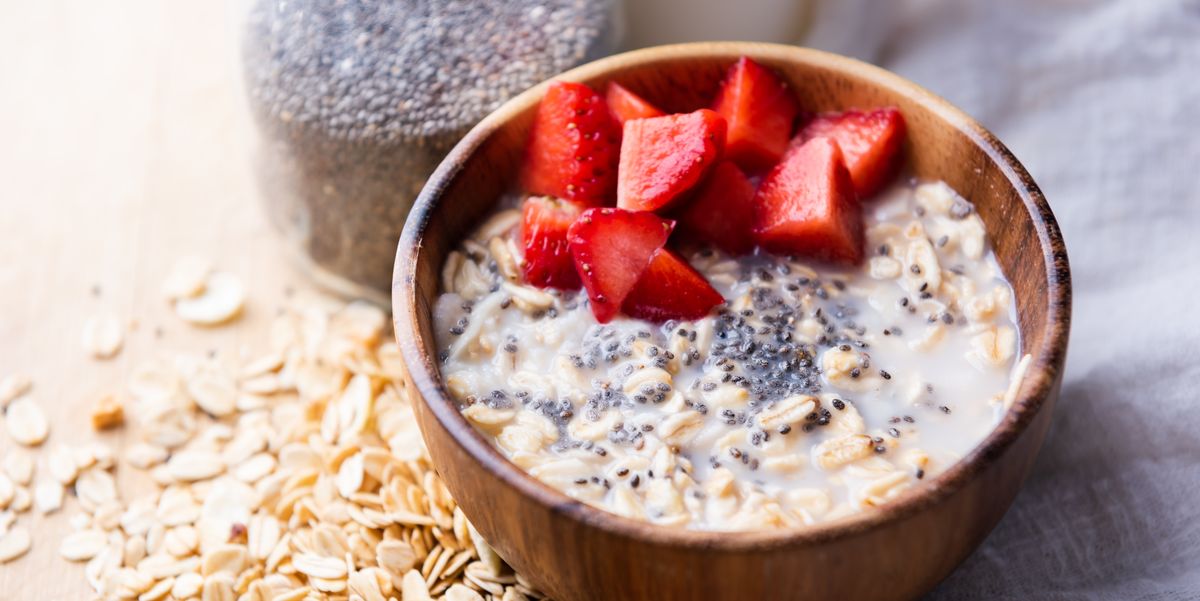Chia seeds have been a pantry essential for health-conscious cooks for years, but most people are still missing out on their myriad benefits. Spoiler: These tiny seeds are absolutely packed with nutrients, making them a powerhouse ingredient you can add to a range of dishes.
But unlike some buzzy nutritional foods, chia seeds have some solid scientific research to back up their health halo. In fact, a recent study found that these seeds can do your health a solid on a range of fronts, including lowering your blood pressure and cholesterol, and even helping you to lose weight.
Here’s the deal with chia seeds, plus why nutrition experts are all about them.
Meet the experts: Scott Keatley, RD, co-owner of Keatley Medical Nutrition Therapy; Christy Brissette, RD, nutritionist and owner of 80 Twenty Nutrition; Danbee Kim, MD, nutrition expert and assistant professor at Rutgers New Jersey Medical School
What did the study find?
The study, which was published in the journal Prostaglandins & Other Lipid Mediators last September, analyzed data from 14 clinical trials that involved 835 people.
Overall, the study found that adding chia seeds to your diet could help lower your cholesterol and your risk of cardiovascular disease, control blood pressure, and help manage weight. Specifically, researchers noted a drop in LDL (bad) cholesterol and blood pressure and a “notable” drop in the levels of triglycerides, a type of fat in the blood that’s linked to heart disease, in individuals who consumed higher amounts of chia seeds. This was actually apparent in people who ate both higher amounts—more than 35 grams—and lower amounts—less than 35 grams—of chia seeds.
What are the health benefits of chia seeds?
Chia seeds have a lot of good things going for them. Fun fact: The Aztecs dubbed them ‘running food’ because they were used as a vital energy source during long expeditions when food supplies were scarce, says Christy Brissette, RD, nutritionist and owner of 80 Twenty Nutrition.
For starters, these tiny seeds are a good source of soluble and insoluble fiber, both of which are good for your digestive health, Brissette says. “Not only does it help you stay regular [with bowel movements], the fiber in chia seeds can help you feel more full and support weight management,” she says.
The soluble fiber can also prevent post-meal blood sugar spikes and helps trap cholesterol to remove it from your body.
Chia seeds are also nutrient-dense, serving up plenty of fiber, omega-3 fatty acids, protein, and micronutrients like calcium, magnesium, and iron, points out Scott Keatley, RD, co-owner of Keatley Medical Nutrition Therapy. “The omega-3s they contain contribute to anti-inflammatory benefits and may support heart health by improving lipid profiles,” he says. “Additionally, their antioxidant content helps combat oxidative stress.”
A previous scientific analysis even found that the antioxidants and polyphenols in chia seeds may help to lower the risk of several cancers, including breast, colorectal, liver, and pancreatic cancers.
How do chia seeds impact the body?
Chia seeds can do a few things for you. “Chia seeds absorb water and form a gel, which slows digestion and can promote fullness, potentially aiding weight management,” Keatley says. (Because they absorb liquid, just be aware that eating them dry in large amounts could cause digestive issues, like bloating and gas.)
Of course, it’s hard to say that adding any one food to your diet will cause a big change in your health. But chia seeds have the potential to add these perks to your life when they’re coupled with other healthy lifestyle habits, according to Danbee Kim, MD, nutrition expert and assistant professor at Rutgers New Jersey Medical School:
- Lower blood pressure and cholesterol
- Promote better digestion
- Help with weight management
- Lower bodily inflammation to help protect against chronic disease
- Help with diabetes blood sugar management
How much should I be consuming?
There isn’t a universally recommended dose for chia seeds. Nutrition experts generally recommend aiming for a tablespoon a day. If you end up having more than that, great. If you’re consuming less, don’t worry. You’re still getting plenty of nutrients and reaping the health benefits.
Just remember: “To prevent digestive discomfort, it’s important to stay hydrated by drinking plenty of water,” Dr. Kim says.
What are the best ways to eat chia seeds?
Chia seeds are surprisingly versatile, Brissette says. She recommends sprinkling them on yogurt, oatmeal, or acai bowls. “They’re also great on top of salads or on avocado toast, or as chia pudding,” she says.
Dr. Kim also suggests adding whole or ground chia seeds to smoothies, juices, pancake batter, and baked goods like muffins and bread.
Brissette even uses chia seeds to replace eggs in baking. “Just mix one tablespoon of chia seeds with three tablespoons of water,” she says. “Let it sit for five minutes and it will form a gel and then add to your wet ingredients.”
Are there any risks or side effects?
Chia seeds can cause bloating or gas if you’re not used to a high-fiber diet, Keatley says. So, start slow before ramping up consumption. And since chia seeds absorb liquid and expand, eating them dry could even pose a choking hazard, Keatley says.
Chia seed allergies do exist, so if you have one, stay away from this health food. (If you’re unsure, Dr. Kim says that chia seed allergies tend to overlap with sesame seed allergies.)
Dr. Kim also recommends being aware that chia seeds may alter the effect of some medications, including drugs used for diabetes and blood pressure, along with blood thinners. They may also interact with some supplements you’re taking. The fiber and phytic acid in chia seeds “may reduce zinc, calcium, and iron absorption,” Dr. Kim says. Basically, if you’re on one of these medications or take a supplement, it’s a good idea to check in with your doctor before adding a steady stream of chia seeds to your diet.
If you don’t have chia seeds in your diet right now, nutritionists recommend giving them a try. “I’m a chia seed superfan,” Brissette says. “They’re nutritional rock stars.”
Korin Miller is a freelance writer specializing in general wellness, sexual health and relationships, and lifestyle trends, with work appearing in Men’s Health, Women’s Health, Self, Glamour, and more. She has a master’s degree from American University, lives by the beach, and hopes to own a teacup pig and taco truck one day.
Read the full article here




